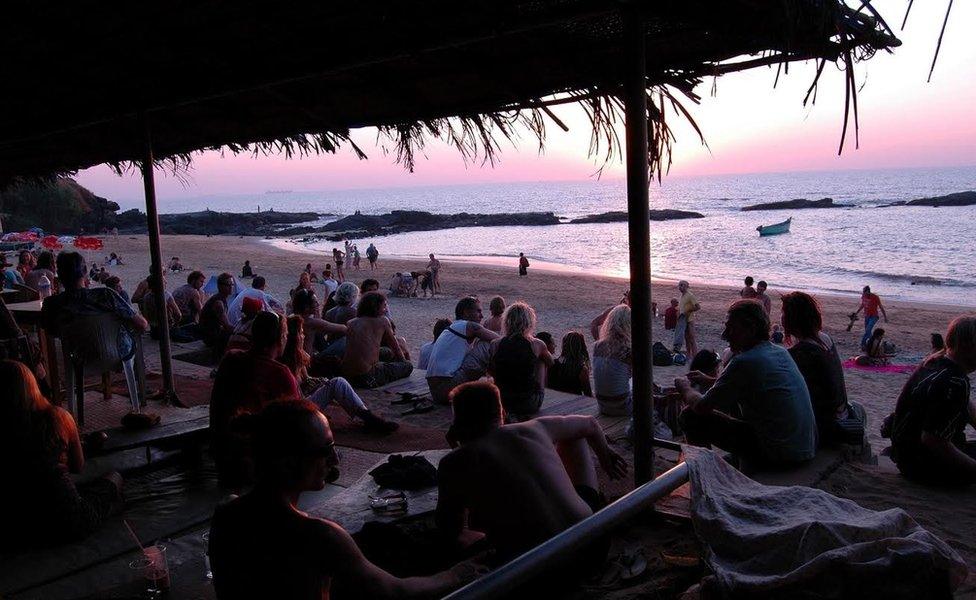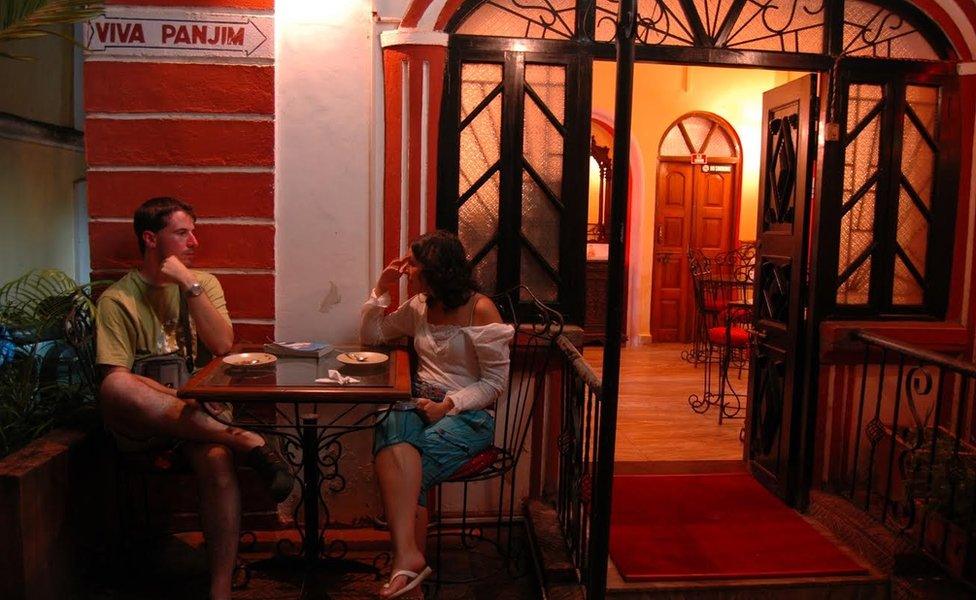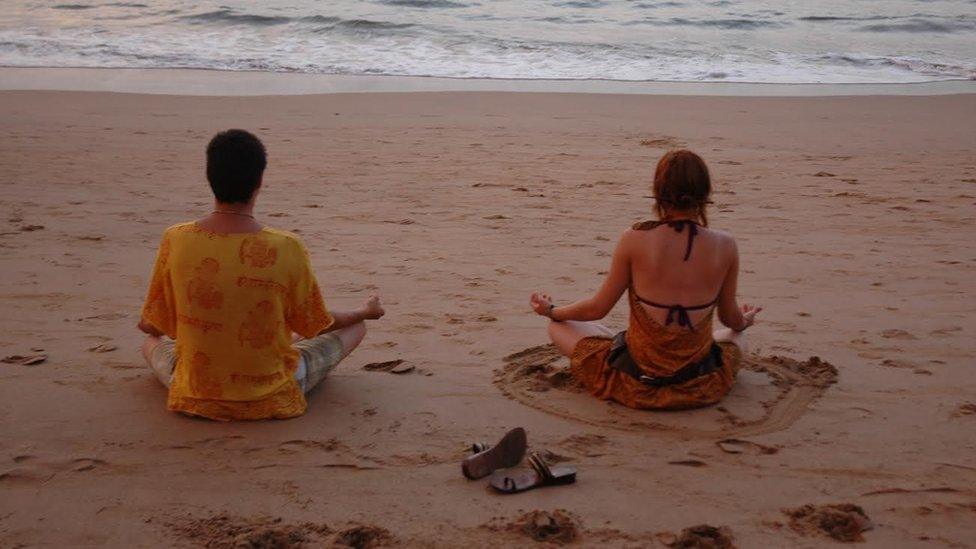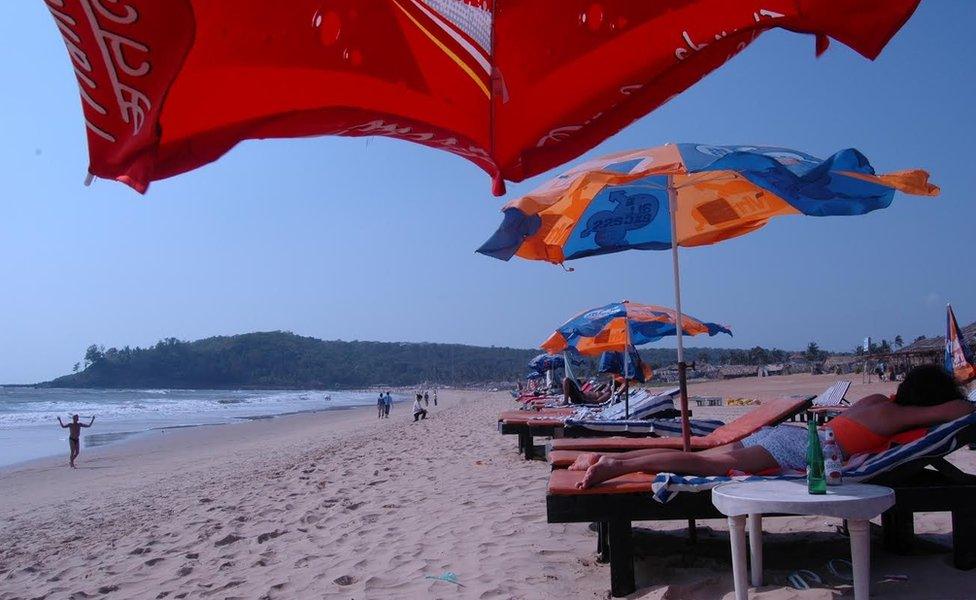Why India's Goa wants its British tourists back
- Published

More than half a million foreign tourists visit Goa every year
Pamela D'Mello explains why India's western state of Goa is making a concerted effort to woo back tourists from Britain.
In three weeks, Roy Barreto will reopen the restaurant he had boarded up during the monsoon, in anticipation of a new season of business.
He is hoping the October sun, and the charter flights that come with it, will bring in more customers to his seafood restaurant Betty's Place, on the banks of the Sal river in south Goa.
This year, he is also hoping his favourite customers - the British holidaymakers - will return to the state.
"The British are adventurous. They go out every day, and want to try different activities. They were the main takers for our day-long dolphin, birdwatching and backwater cruises," says Mr Barreto. He remembers a time when the winter sunseekers from the UK were the largest group of foreign visitors to Goa.
That was, of course, before recession hit Europe, the holiday market graph went south and Mr Barreto's business took a direct hit.
The highpoint was the 1990s when some 190,000 Britons headed to Goa for 14-night seaside getaways before security issues post-9/11 threw the global travel sector out of whack.

The European recession has meant fewer people are travelling abroad
By 2014 though, Russian tour operators had managed to sell Goa holidays to 189,000 Russians, outnumbering the 129,000 British arrivals - both still the largest chunk of Goa's 513,000 foreign visitors, according to the Economic Survey of Goa.
This year, though, Goa is waking up to the fact that the Russian market has also almost gone bust. Sanctions, low oil prices and the falling rouble have hit the Russian economy.
As a result, charter flights have dropped to 895 in 2014-15 from 1,128 in 2013-14.
Goa's tourism trade body (TTAG) and a state-level marketing committee went into a huddle and decided to step up efforts to bring back British and West European travellers.
The issue figured in the state legislative assembly in August, when a legislator from the governing Bharatiya Janata Party, Michael Lobo, said Britons were avoiding Goa due to rising incidents of bag snatching, the murder of British teenager Scarlett Keeling, external and Goa's inability to solve its garbage management problems.
Another reason behind the drastic drop in visitors was India tightening its visa regime in 2008 after the Mumbai attacks. Single-entry visas replaced multiple-entry ones and long visa queues became the norm. Those exiting the country could only return after two months - now reduced to two weeks - and tourist visa holders still have to leave the country after 180 days.

Authorities in Goa have stepped up efforts to bring back British and West European travellers
The TTAG concentrated on fixing the things it could.
It lobbied the government in Delhi to extend e-visa and visa-on-arrival facilities to visitors from the UK, Scandinavia, and Western Europe.
It petitioned the authorities to reduce visa fees for British visitors to £40 ($62) for a one-month tourist visa from £105 ($163), sidestepping the reciprocity principle that normally underpins visa fees.
TTAG also pushed for a rollback of proposed increases in aircraft landing fees and managed to secure three extra landing slots per week for Thomas Cook aircraft bringing British tourists from Gatwick, according to spokesman Ralph de Souza.
"It was only after we did an in-depth study and presented the economic spin-offs to the ministry, were we able to have the system eased," he said.
Former construction professional Robert Drury, 62, who, since 2007, has been spending most of his year in Goa's Arpora, says the two-month rule has been particularly expensive.

Tourists come to Goa for the winter sun and its sandy beaches
"Now we just go back to the UK or maybe Thailand for two weeks after our 180 days are up. I don't think there's any place else I'd rather be. The cost of living is cheap, the sunny weather is perfect for my health, and there's a terrific selection of restaurants my wife and I can frequent."
A former risk manager in London and Nigeria, Paul Gatward says that though Sri Lanka and Malaysia are also wooing long-term visitors, and Thailand and Vietnam may be marginally cheaper, "Goa is perceived as a far easier place to come and spend time. English is widely spoken, it is peaceful, touristy, coastal, and the locals can be very helpful".
But the big question is whether Goa will be able to woo back the two-week holidaymaker who once headed there for a quiet soak in the sun.
Britain's Monarch Holidays is already marketing the reduced visa fees.
Guitry Velho, manager of the Heritage Village Club hotel in south Goa's Arrosim, is upbeat. "We have always had a majority of British tourists. They appreciate us and what we provide for them, and tend to stay for a minimum of 14 nights just enjoying South Goa."
Hotelier and TTAG head Francisco de Braganca said: "The feedback is that they are the most preferred guests, the kind every hotelier and restaurant owner is most comfortable with."